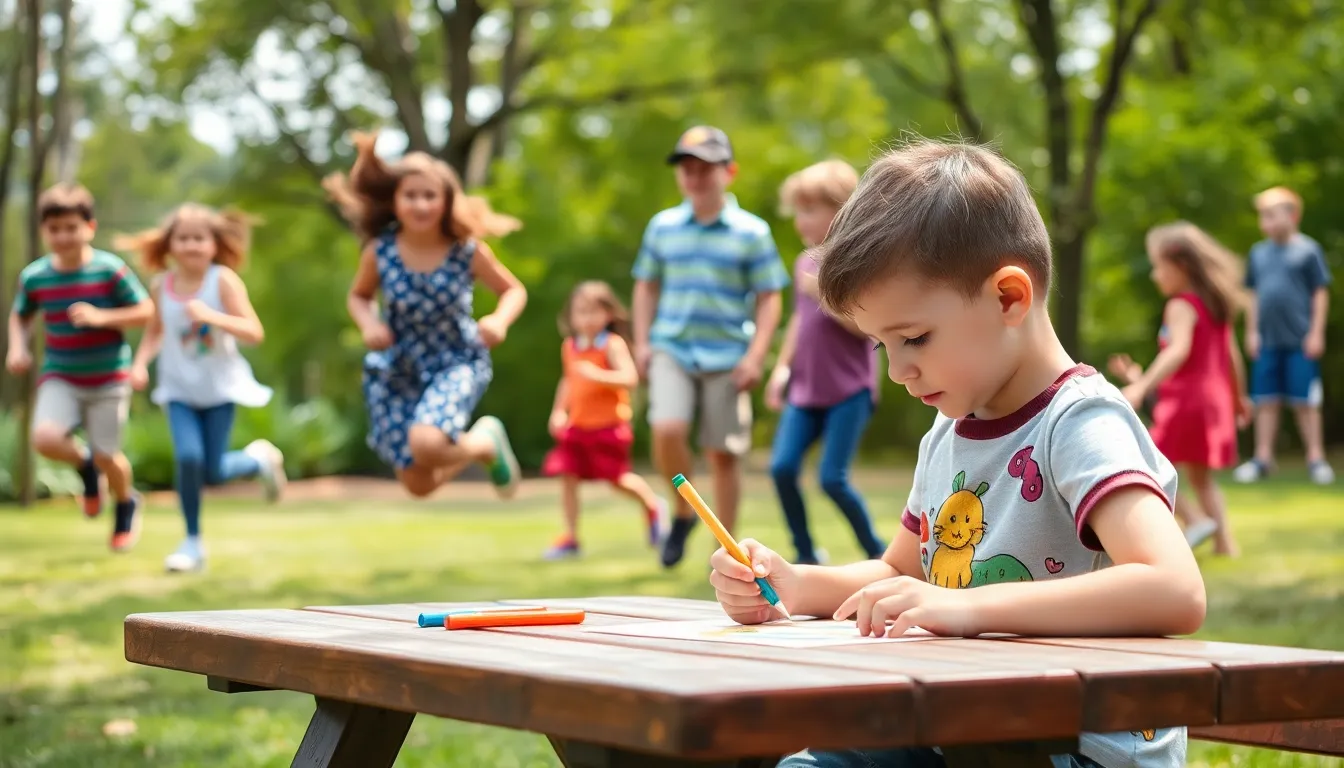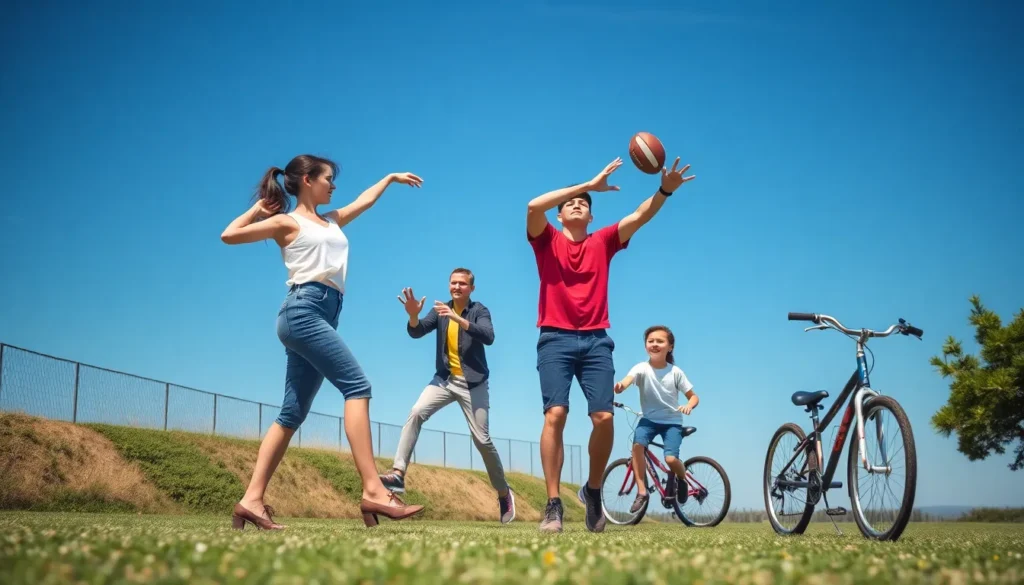Physical skills are the unsung heroes of everyday life. From the graceful leap of a dancer to the precise movements of a surgeon, these skills shape how individuals interact with the world. Whether it’s catching a frisbee or mastering the art of parallel parking, physical skills play a crucial role in personal and professional success.
But let’s face it, not everyone is destined to be a world-class athlete or a ballet prodigy. The good news is that physical skills come in all shapes and sizes. They can be honed and perfected, often with a little practice and a dash of humor. So, whether you want to impress at your next family barbecue or simply navigate the grocery store without a cart collision, exploring various examples of physical skills can inspire anyone to step up their game.
physical skills examples
Physical skills encompass a wide range of abilities essential for various activities. These skills include coordination, flexibility, strength, and balance. Each category plays a vital role in executing specific tasks effectively.
Coordination manifests in activities like throwing a ball or playing an instrument. Flexibility supports actions such as reaching for objects or executing dance moves. Strength influences performance in weightlifting or carrying heavy items. Balance is crucial for activities like gymnastics or walking on a narrow surface.
Developing these skills occurs through consistent practice and targeted training. Various sports and fitness programs focus on enhancing specific physical skills. For instance, yoga improves flexibility and balance, while strength training targets muscle development.
Participating in team sports cultivates coordination and teamwork. Individual activities, such as martial arts, enhance focus and discipline. Each avenue offers valuable lessons applicable beyond athleticism, including improved posture and increased endurance.
Age and physical condition impact one’s capability to develop these skills. Early engagement in physical activities fosters lifelong benefits. In contrast, adults can still improve their physical skills by dedicating time and effort to practice.
To summarize, physical skills serve as a foundation for various life activities, ensuring individuals can navigate challenges efficiently. Exploring these skills opens doors to personal growth and improved interactions.
Types Of Physical Skills

Physical skills fall into two main categories: gross motor skills and fine motor skills. Each type plays a vital role in daily activities and overall physical development.
Gross Motor Skills
Gross motor skills involve large muscle groups and focus on movements that require strength, coordination, and balance. Activities such as running, jumping, and throwing highlight these skills. Individuals often use gross motor skills for sports, outdoor play, and general mobility. Strengthening these skills promotes physical fitness and enhances body awareness. Participating in team sports, dance, and even walking contribute to improving gross motor abilities. Regular practice ensures that people develop coordination necessary for various activities.
Fine Motor Skills
Fine motor skills require the use of smaller muscle groups, focusing on precise movements involving the hands and fingers. Tasks like writing, drawing, and buttoning clothes exemplify fine motor skills. These movements demand hand-eye coordination and dexterity. Improving fine motor skills benefits tasks requiring attention to detail and coordination. Engaging in activities such as playing musical instruments or crafting fosters fine motor skill development. Enhanced fine motor skills not only improve daily task performance but also support cognitive development and academic achievements.
Examples Of Physical Skills
Physical skills encompass diverse abilities that contribute to effective performance in various contexts, including sports and everyday tasks.
Sports-Related Skills
Athletes rely on sports-related skills, which include coordination, agility, and endurance. Coordination plays a critical role in activities like soccer and basketball, enabling precise movements and effective teamwork. Agility allows players to change direction quickly, important for sports such as tennis and football. Endurance supports sustained physical activity, crucial for long-distance running and swimming. Developing these skills often occurs through targeted training and practice, with specific drills enhancing performance in competitive settings.
Everyday Life Skills
Everyday life skills involve those physical abilities essential for daily tasks. Strength and flexibility significantly impact how individuals perform activities like lifting groceries or reaching for items on high shelves. Balance supports walking on uneven surfaces, ensuring safety in various environments. Fine motor skills contribute to tasks such as typing or cooking, where precision matters. Engaging in regular physical activities like gardening or playing with children fosters the development of these vital skills, promoting overall well-being.
Benefits Of Developing Physical Skills
Developing physical skills enhances overall health and fitness. Improved coordination contributes to better performance in daily activities, making tasks more manageable. Strength training builds muscle, which supports vital movements such as lifting and carrying. Flexibility allows for greater range of motion, preventing injuries and enhancing athletic performance.
Participation in activities that cultivate physical skills leads to increased self-confidence. Gaining competence in sports or dance encourages individuals to push their boundaries. Emphasizing teamwork in group sports fosters social connections and communication skills. Enhanced balance aids in injury prevention in both active pursuits and everyday life.
Practicing physical skills promotes mental well-being through the release of endorphins. Engaging in regular exercise reduces stress and anxiety, leading to improved mood. Concentration and focus improve as individuals engage in structured physical activities. Fine motor skills, developed through crafts or music, also support cognitive functions, which may enhance academic performance.
Physical skills also play a vital role in long-term health. Consistent engagement in physical activity lowers the risk of chronic diseases, such as obesity and heart disease. Older adults benefit significantly from maintaining strength and balance, reducing the risk of falls. Overall, prioritizing the development of physical skills greatly impacts personal and social life, influencing relationships, health, and emotional well-being.
Conclusion
Developing physical skills is essential for enhancing daily life and overall well-being. These skills not only improve performance in sports and activities but also contribute to personal growth and social interactions. By engaging in various exercises and practices, individuals can cultivate coordination, strength, flexibility, and balance.
Whether through team sports or individual pursuits, the benefits of honing physical skills extend beyond the body. They foster confidence, reduce stress, and promote healthier lifestyles. Embracing the journey of skill development can lead to lifelong advantages that enrich both personal and professional experiences.

